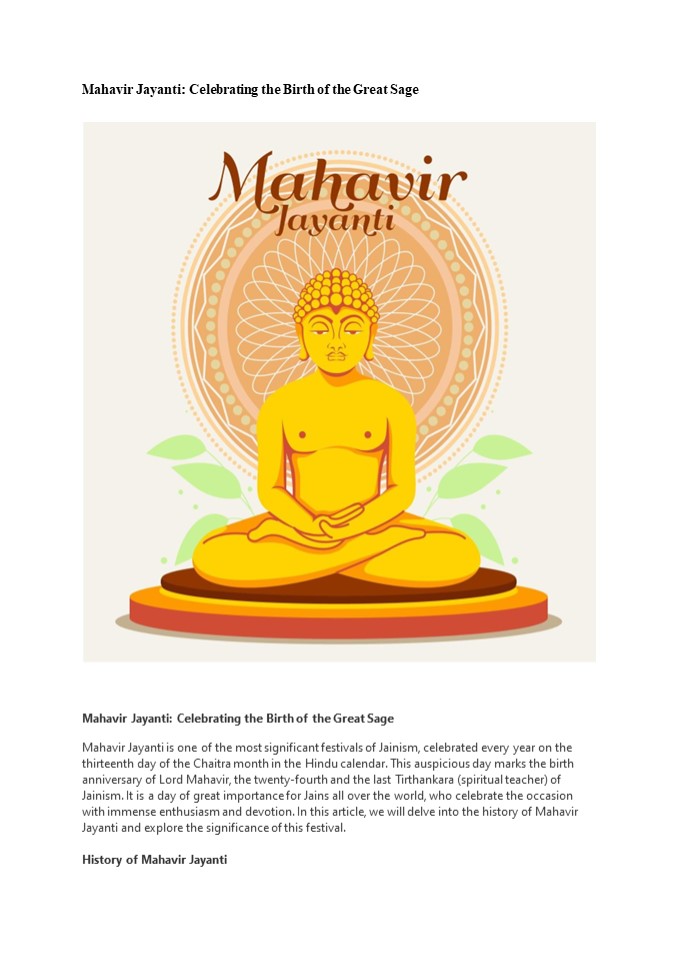Mahavir Jayanti: Celebrating the Birth of the Great Sage
Title:
Mahavir Jayanti: Celebrating the Birth of the Great Sage
Description:
Mahavir Jayanti is a day of great significance and importance for Jains all over the world. It marks the birth of their most revered spiritual leader, Lord Mahavir, and celebrates the principles of non-violence. –
Number of Views:1
Title: Mahavir Jayanti: Celebrating the Birth of the Great Sage
1
Mahavir Jayanti Celebrating the Birth of the
Great Sage
Mahavir Jayanti Celebrating the Birth of the
Great Sage Mahavir Jayanti is one of the most
significant festivals of Jainism, celebrated
every year on the thirteenth day of the Chaitra
month in the Hindu calendar. This auspicious day
marks the birth anniversary of Lord Mahavir, the
twenty-fourth and the last Tirthankara (spiritual
teacher) of Jainism. It is a day of great
importance for Jains all over the world, who
celebrate the occasion with immense enthusiasm
and devotion. In this article, we will delve into
the history of Mahavir Jayanti and explore the
significance of this festival. History of
Mahavir Jayanti
2
Mahavir Jayanti commemorates the birth of Lord
Mahavir, who was born in 599 BCE in Kundagrama,
a small town in present-day Bihar, India. He was
born into the royal family of King Siddhartha
and Queen Trishala. According to legend, when
Queen Trishala was pregnant, she had fourteen
auspicious dreams, which were interpreted by a
group of wise men as a sign that she would give
birth to a great soul. The dreams were said to
signify that the child would become a
Tirthankara, a spiritual leader who would show
the path of liberation to the suffering
souls. As predicted, Lord Mahavir grew up to be
a spiritual leader and philosopher who preached
the principles of ahimsa (non-violence),
anekantavada (pluralism), and aparigraha (non-
possessiveness). He renounced his luxurious life
and embarked on a spiritual quest, meditating
and practicing austerities for twelve years
before achieving enlightenment. He then spent the
rest of his life preaching his teachings and
guiding people on the path of liberation. Mahavir
Jayanti Celebrations Mahavir Jayanti is
celebrated with great enthusiasm by Jains all
over the world. The celebrations begin with a
ritual called Abhisheka, where the idol of Lord
Mahavir is bathed with milk, saffron, and other
holy substances. This is followed by a procession
of the idol, which is carried out in a
palanquin, accompanied by chanting of hymns and
prayers. The procession ends at a temple or a
community center, where devotees offer prayers
and perform puja (worship). The day is also
marked by a special meal called the Mahavir Swami
Bhojan, which is prepared without onions,
garlic, and other root vegetables, as Jains
practice strict vegetarianism. The meal is
shared among the community members, symbolizing
the principle of sharing and communal
harmony. Another important aspect of Mahavir
Jayanti celebrations is charity and compassion
towards all living beings. Jains believe in the
principle of ahimsa, which means non-violence
towards all living beings. On this day, Jains
perform acts of kindness and compassion towards
animals and humans, such as donating food,
clothes, and money to the needy. Significance of
Mahavir Jayanti Mahavir Jayanti holds immense
significance for Jains as it marks the birth of
their most revered spiritual leader, Lord
Mahavir. His teachings have had a profound impact
on Jainism, shaping its philosophy and guiding
its followers on the path of liberation. Mahavir
Jayanti also symbolizes the principles of
non-violence, pluralism, and non-
possessiveness, which are the fundamental tenets
of Jainism. Jains believe that by practicing
these principles, one can attain inner peace and
spiritual enlightenment. The festival also
promotes communal harmony and unity, as Jains
from different parts of the world come together
to celebrate the occasion. It is a day of joy and
festivity, where people forget their differences
and embrace the spirit of brotherhood and
love. Mahavir Jayanti also serves as a reminder
to people to follow the path of righteousness and
compassion towards all living beings. It
inspires people to lead a life of simplicity,
humility, and selflessness, and to contribute
towards the betterment of society and the world
at large.
3
Mahavir Jayanti is a day of great significance
and importance for Jains all over the world. It
marks the birth of their most revered spiritual
leader, Lord Mahavir, and celebrates the
principles of non-violence, pluralism, and
non-possessiveness. The festival promotes
communal harmony, unity, and brotherhood and
inspires people to lead a life of righteousness
and compassion towards all living beings. On
this auspicious day, let us remember the
teachings of Lord Mahavir and strive towards
attaining inner peace and spiritual enlightenment.

